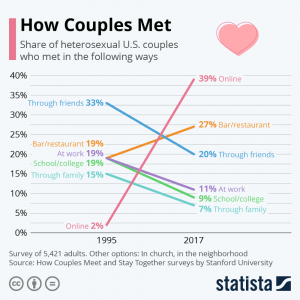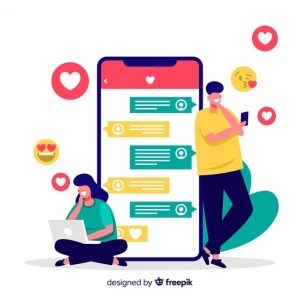Swiping Right but for Who?: When dating meets data
By Elaine Chang | September 22, 2021
Online dating is a mainstay of modern culture. A study from Stanford found that around 40% of American couples initially met online, the most common medium of matchmaking. The act of swiping itself has elevated into its own set of idioms in the English language and culture – “swipe left” signals declining a potential match, “swipe right” indicates accepting a potential match. And there are so many online dating apps to choose from, depending on who you ask and what experience you may be looking for.

There is a striking shift in the matchmaking medium as American couples increasingly meet via online dating apps / websites. We should note 1) there have been many many changes from 1995 to 2017 that enabled online dating not previously possible and 2) this study is a slice of what dating looks like (American, heterosexual, technologically able)
The pandemic has only increased the use of these handheld matchmaking services – Tinder recorded its highest number of swipes on a single day totaling to 3 billion in March 2020 while OkCupid saw a 700% increase in dates from March to May 2020. Individuals typically assume that these interactions – whether direct or indirect – are private. Its a digital space for individuals to find their potential matches, get to know each other beyond the standard profile fields.

Online dating apps often ask personal questions as part of a user’s profile and offers features such as chatting via app
And while this advent of options and opportunity has undoubtedly stirred love in the digital airwaves, recent reports highlight a growing concern of what else is being aired out in the digital airwaves in the name of love. A NYTimes investigation found some disturbing details. It found that when they tested the Grindr Android app, the app shared specific latitude and longitude coordinate information with five companies. NYTimes researchers also found that the popular app OKCupid sent a user’s ethnicity and answers to profile questions such as whether they’ve used psychedelic drugs to a firm that helps companies tailor marketing messages to users. A Nightly News segment highlighted similarly disturbing practices on dating apps Hinge and Bumble. Hinge sent information of all its users to Facebook, whether they logged in via Facebook or not. Bumble sent encrypted information to undisclosed, outside companies. All companies cited their privacy policy when followed up by reporters.

Apps, such as dating apps, are sending information to different companies. Some locations are
disclosed while others are not.
These revelations show a few worrying trends related to users and their data. First, profiling of users on their own device without explicit and informed consent. Businesses are quietly creating profiles of individuals using activity, targeting them with ads and attempting to influence their behavior – all on a user’s personal device and all relatively unbeknownst to the user themselves.
Secondly, the treatment of user data both from a lack of privacy perspective as well as a lack of respect. A recent study done by the Norwegian Consumer Council suggested that some companies treat personal and intimate information of a user, such as gender preference similar to innocuous data points about the individual such as favorite food. Finally and more broadly, as
these dating apps increasingly influence love and relationships as we know it, their profile options and app interactions are then to increasingly define culture. There is a responsibility of how to do so thoughtfully and responsibly (e.g., gender pronouns, features in the time of corona).
Ultimately, consumers trust their device and by extension apps (not only but including dating apps). Companies may need to be compelled to change through updated rules and regulation. Until then, it may behoove us all to swipe left more often on the next potential app download.
References
https://qz.com/1546677/around-40-of-us-couples-now-first-meet-online/
https://fortune.com/2021/02/12/covid-pandemic-online-dating-apps-usage-tinder-okcupid-bumble-meet-group/
